![oscars 2015 star wars the force awakens]()
It's fitting that "
Star Wars: The Force Awakens" has become a disruptive force in the Oscar race.
After all, the
Oscars aren't just about writing the current movie year into the history books. They're often about rewriting past history -- righting old wrongs, settling old scores, and dealing with unresolved old resentments and controversies that have returned with a vengeance. (Remind you of any current blockbuster space operas?)
Think about
last year, where the main competition between "
Boyhood" and "
Birdman" got pushed to the side, in favor of bitter arguments about how long-odds contenders "
Selma" and "
American Sniper" depicted recent historical events. Considering how many people learn their history in movie theaters, rather than classrooms, it mattered a great deal, especially to people who were directly involved, how accurate those two films were, how they interpreted controversial events, and whether the Academy would validate those interpretations with golden trophies.
This year, thankfully, there are few of those controversies, at least when it comes to potential award-winning movies about real-life people. Sure, some individuals who are portrayed in an unflattering light in "
Spotlight" and "
Straight Outta Compton" have complained. Pundits have made similar complaints about "
Steve Jobs" and "
Trumbo," but since hardly anyone saw those movies, no one seems to care. There were loud gripes about "
Truth," but that
box office flop also fell off the awards radar. And now that "
Joy" and "
The Big Short" are screening widely, there may be grumbling about the wildly imaginative liberties those movies take with the historical record. But so far, at least, there hasn't been the kind of sustained screaming we heard last year over "Selma" and "Sniper," or over such recent Oscar front-runners as "
Argo," "
Zero Dark Thirty," and "
The Social Network."
Instead, the historical issues this year are strictly Hollywood-centered. Should
Leonardo DiCaprio finally get a Best Actor Oscar for "
The Revenant"? Most pundits seem to think he should, not just because his rugged, ragged performance as a frontiersman fighting for survival merits a prize, but because it would make up for two decades of Oscar snubs.
Similarly, if
Michael Keaton wins a supporting prize for "Spotlight," it'll make up for his never having won, especially for last year's "Birdman," a Best Actor trophy he was highly favored to win. If likely honoree
Ridley Scott wins Best Director for "
The Martian," it'll be validation for the Oscar-less 78-year-old, who didn't even win the prize for his Best Picture honoree "
Gladiator" 15 years ago.
And what about
Harrison Ford? The 73-year-old is one of the most beloved stars in the galaxy, but he's never won an Oscar. In fact, he was nominated only once, 30 years ago, for "
Witness." But thanks to "Star Wars: The Force Awakens," there's now talk of a supporting actor nomination for him. It'll be an uphill battle for Ford, whose chief competition may be Keaton, "
Bridge of Spies" co-star
Mark Rylance, and another old-timer reprising an Iconic role he created in the 1970s. That would be
Sylvester Stallone, who was nominated 39 years ago for writing "
Rocky" and playing Rocky Balboa, and who is almost certain to be nominated this year for playing the character again in "
Creed."
The late entry of "The Force Awakens" into the Best Picture and Best Supporting Actor races has caused other upheavals. Most notably, it led to a controversy at the Critics' Choice Awards, two of whose voters quit the organization this week in protest over the group's late
addition of "The Force Awakens" to its already-issued list of Best Picture nominees.When the Broadcast Film Critics Association, the group behind the Critics' Choice Awards,
announced its nominees on December 14, its members hadn't even seen the new "Star Wars" yet, as Disney was keeping the film under wraps and spoiler-free until just a few days before its release. Citing the association's own history -- they made a similar exception 15 years ago for "
Cast Away" when it screened late and proved a worthy addition to the list of Best Picture nominees -- the BFCA held an emergency vote and agreed to make the new "Star Wars" the 11th nominee on this year's Best Picture list. But they did not add it to any other categories.
BFCA member Eric Melin (who's also the president of the Kansas City Film Critics Circle) immediately quit the group. In his
resignation letter, he complained that the "Star Wars" waiver "smells like a desperate ploy to get better TV ratings." (The Critics' Choice Awards airs January 17, a week after the Golden Globes, on A&E and Lifetime.)
Salt Lake City critic Scott Renshaw wrote a similar
resignation letter, saying, "It is obvious to me that this decision is based more on ['The Force Awakens"'] marketing value than on making sure that the best films are included. If that were the case, the entire nomination process would have been opened up again to allow 'The Force Awakens' to be considered in all categories. Any suggestion this decision was made primarily for any reason other than to improve ratings for the awards broadcast feels disingenuous at best." (Neither Melin nor Renshaw were BFCA members in 2000 during the "Cast Away" decision.)
Why does this matter? In part, it matters because the
Critics' Choice Awards have historically been a highly accurate predictor of the Best Picture nominees ultimately picked by the Academy. Adding "Star Wars" to the list indicates, at the very least, increased odds that Oscar voters will nominate the film as well.
The incident also shows the bind critics are in over the year's last-minute releases -- not just "Star Wars," but also such likely contenders "
The Hateful Eight," "The Revenant," and "
Joy" -- movies that either screened too late for many awards groups to see them or else didn't even get sent on screener DVDs to awards voters until late December. Sure the awards groups could all wait until after New Year's Eve to issue their lists, but that would mean each group's announcement would be crowded into the first nine days of January (since no one cares what the critics say after the
Golden Globes ceremony and the Oscar nominations announcement in the second week of January), and none of them would stand out or get much attention. In recent years, there's been a race among critics' groups to be the first out of the gate, leading to an announcement creep that now sees some groups touting the year's best movies at the end of November. The studios, however, haven't accommodated the awards groups by screening or sending out their year-end movies any sooner; after all, they have their own marketing plans to stick to, regardless of what critics want. So the critics are forced either to bend their own rules to accommodate the studio marketers or leave potentially worthy movies off their lists.
And the question raised by Melin and Renshaw -- Is it pandering to include a blockbuster like "The Force Awakens" that doesn't need awards validation to get noticed? -- is the biggest historical controversy at the heart of this year's awards race. As this column noted
last week, the Academy has seldom given crowd-pleasing genre movies that are also critical favorites their due. This year, however, it has several chances to change that by recognizing such hits as "
Mad Max: Fury Road," "The Martian," "Creed," "Compton," and "
Inside Out."
Not to mention "The Force Awakens." Remember, 38 years ago, the first "
Star Wars" was nominated for Best Picture and nine other Oscars, but the top prizes that year went to "
Annie Hall." If the new "Star Wars" wins big this year, will that redress a historical wrong? Or will it be a sign that the dark side of the Force is ascendant?
%Slideshow-347364%
![]()
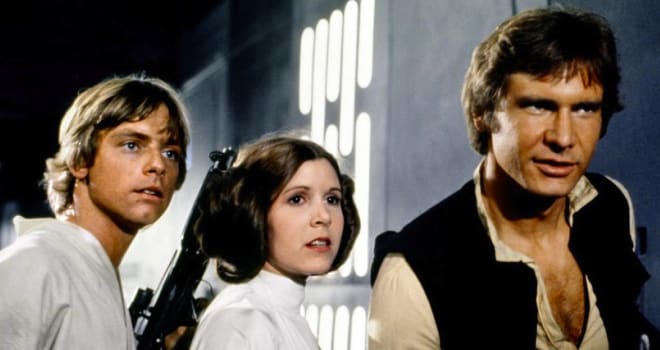
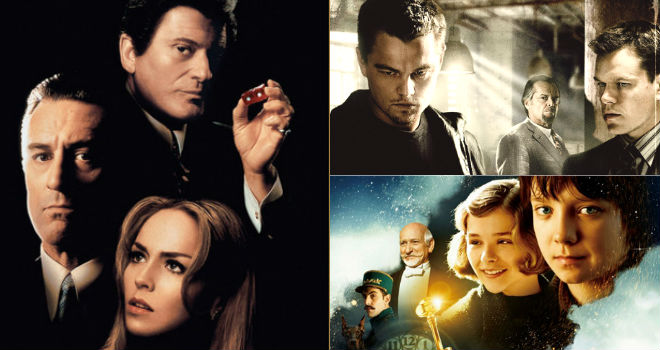
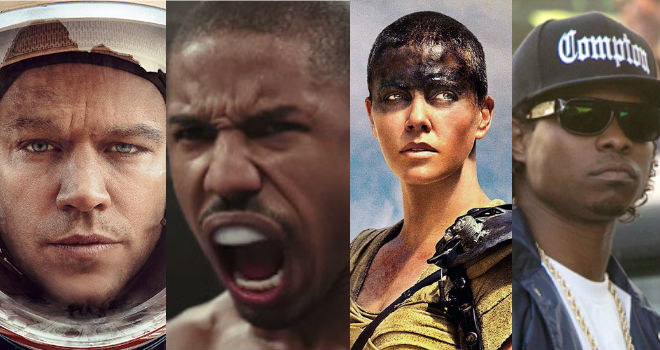
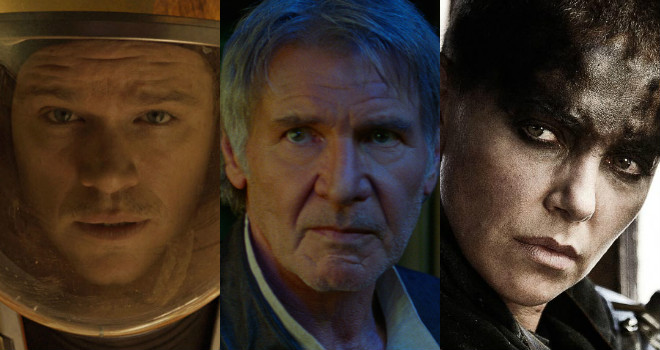 You'll notice that not a lot of critics, much less awards-nomination lists like those of the
You'll notice that not a lot of critics, much less awards-nomination lists like those of the  The opening of "
The opening of "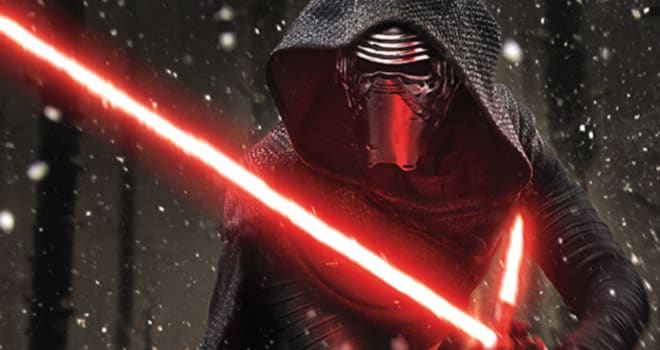 Thanks to "Star Wars," total domestic sales at the multiplex for all movies this weekend came to $300.9 million, breaking yet another record (total sales over a three-day weekend). At this point, the total box office for the year stands at $10.4 billion, just a shade ahead of the total take at this time in 2013, which was the most lucrative year on record. So "Star Wars" could help push 2015 as a whole into the record books over the next two weeks.
Thanks to "Star Wars," total domestic sales at the multiplex for all movies this weekend came to $300.9 million, breaking yet another record (total sales over a three-day weekend). At this point, the total box office for the year stands at $10.4 billion, just a shade ahead of the total take at this time in 2013, which was the most lucrative year on record. So "Star Wars" could help push 2015 as a whole into the record books over the next two weeks.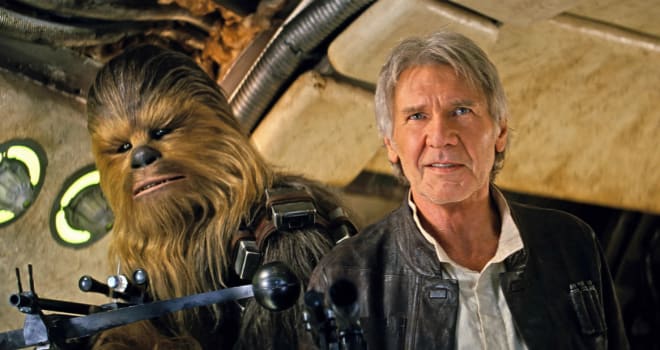 1. Fan Service
1. Fan Service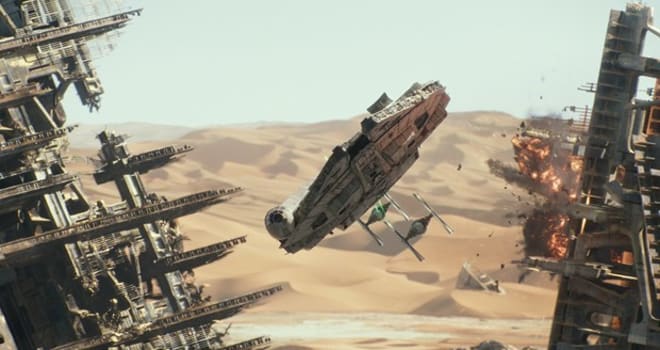 2. Non-stop Marketing
2. Non-stop Marketing 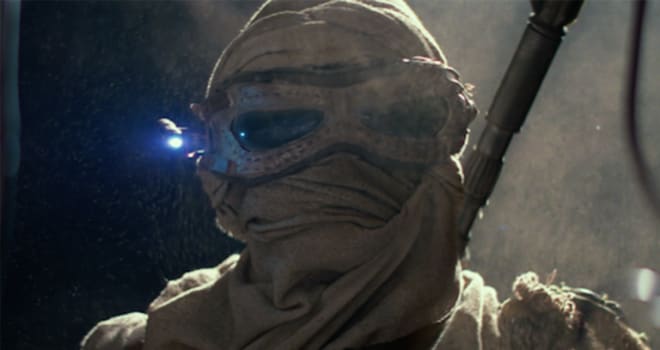 3. Keeping Audiences (Largely) Free of Spoilers
3. Keeping Audiences (Largely) Free of Spoilers 4. Making the Film a Cultural Event
4. Making the Film a Cultural Event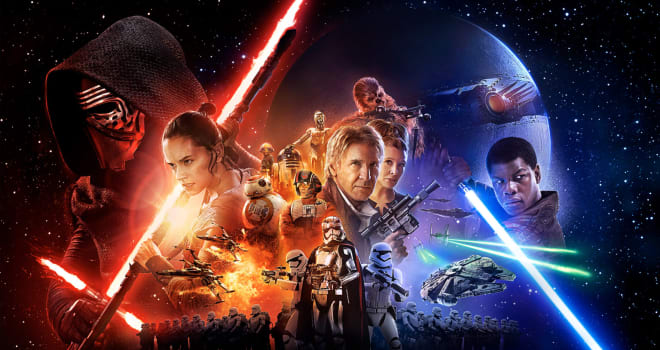 As huge as the debut was, could it have been even bigger?
As huge as the debut was, could it have been even bigger?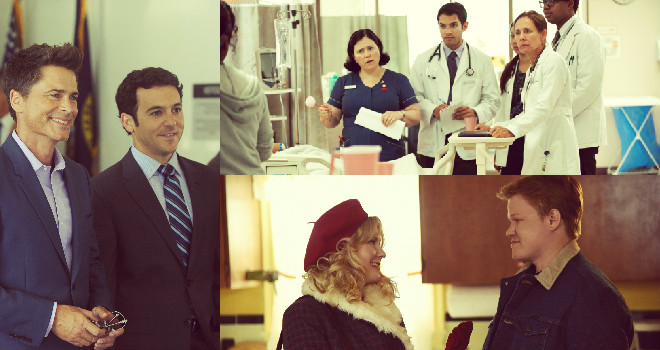
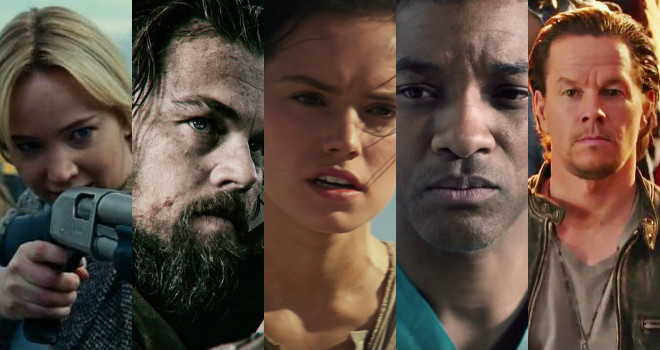 Believe it or not, there was a lot more than just "
Believe it or not, there was a lot more than just "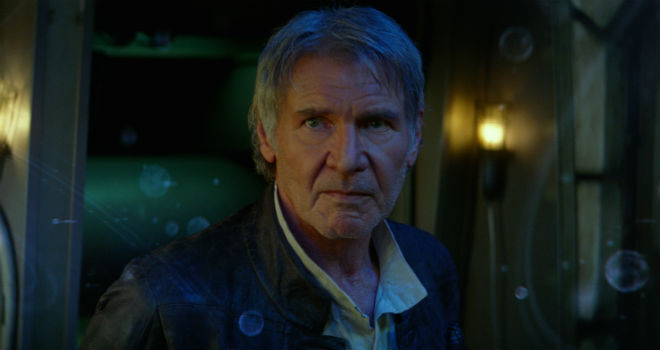 It's fitting that "
It's fitting that "
 But not everything about the migration of the awards season to the Internet is running smoothly. Over at the
But not everything about the migration of the awards season to the Internet is running smoothly. Over at the  The paradox in this drive to make awards screenings and voting digital is that many of this year's most noteworthy films are self-conscious throwbacks to earlier movies, earlier eras, and earlier technologies. The "
The paradox in this drive to make awards screenings and voting digital is that many of this year's most noteworthy films are self-conscious throwbacks to earlier movies, earlier eras, and earlier technologies. The " Another weekend,
Another weekend,  1. Lack of Star Power
1. Lack of Star Power 3. Less-than-universal Praise From Critics
3. Less-than-universal Praise From Critics 5. The Boycott
5. The Boycott
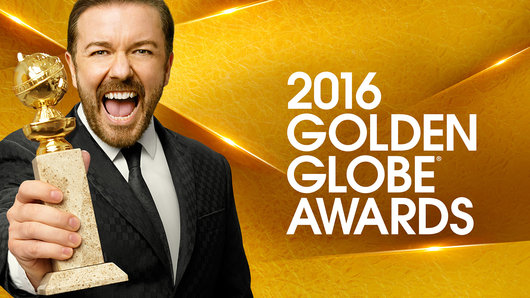 "They don't go safe. They go bold. Sometimes that's disastrous, and sometimes it's absolutely wonderful."
"They don't go safe. They go bold. Sometimes that's disastrous, and sometimes it's absolutely wonderful."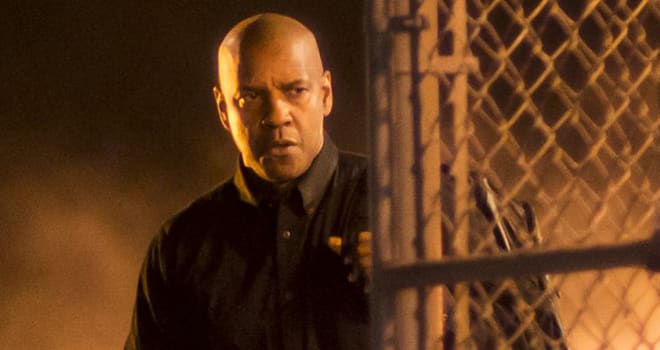 2.
2. 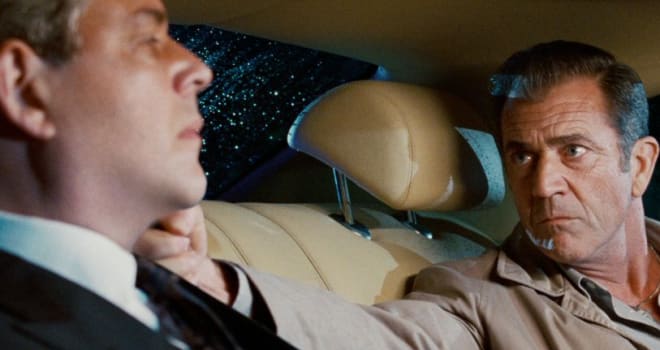 4.
4. 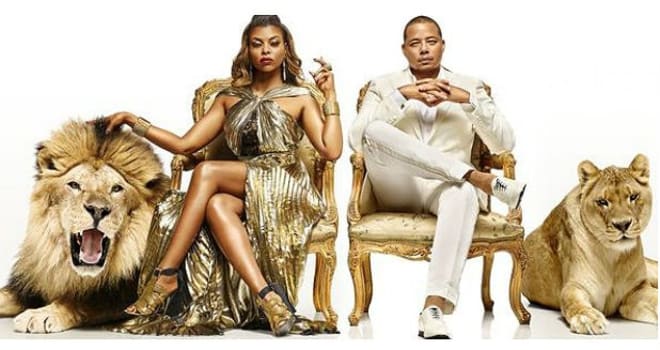 6. Small-Screen Celebs
6. Small-Screen Celebs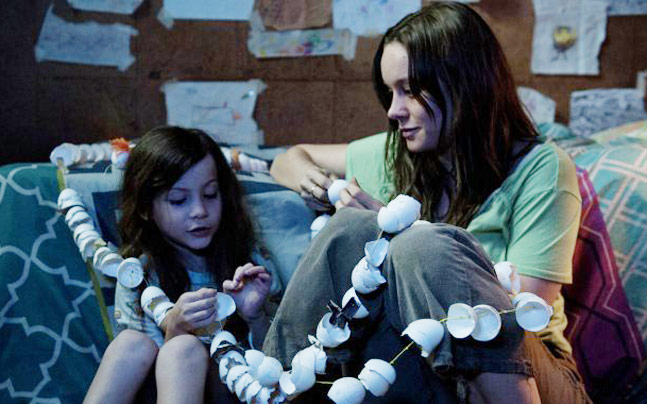 8. A Coronation for
8. A Coronation for 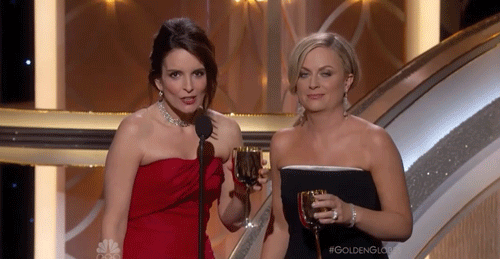 10. Alcohol. Lots of it.
10. Alcohol. Lots of it.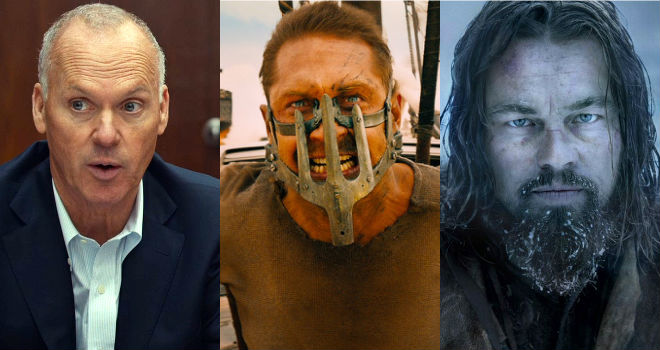 It's one week until the Oscar nominations are announced, and pundits often think they know how the Academy members will vote. But then we learn what Hollywood really thinks from the industry insiders who actually make the movies: The members of the guilds.
It's one week until the Oscar nominations are announced, and pundits often think they know how the Academy members will vote. But then we learn what Hollywood really thinks from the industry insiders who actually make the movies: The members of the guilds.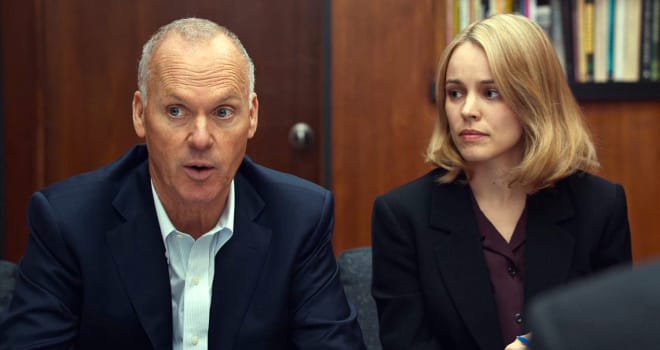 Earlier this week, the National Society of Film Critics, a group that prides itself on voting according to its members' own quirky taste and not the conventional wisdom, named "Spotlight" the group's Best Picture. If even the NSFC picked "Spotlight," as so many other groups already have, then surely the consensus is right this time, and the ensemble drama about the investigative reporters who exposed the Catholic Church's pedophilia cover-up is truly the top candidate for a Best Picture Oscar.
Earlier this week, the National Society of Film Critics, a group that prides itself on voting according to its members' own quirky taste and not the conventional wisdom, named "Spotlight" the group's Best Picture. If even the NSFC picked "Spotlight," as so many other groups already have, then surely the consensus is right this time, and the ensemble drama about the investigative reporters who exposed the Catholic Church's pedophilia cover-up is truly the top candidate for a Best Picture Oscar. The producers, whose guild prize is usually a very good predictor of who'll get a Best Picture Oscar nomination, did include "Spotlight," as well as Oscar front-runners "The Martian," "The Revenant," and "Mad Max: Fury Road." They also echoed the rising support for such films as "
The producers, whose guild prize is usually a very good predictor of who'll get a Best Picture Oscar nomination, did include "Spotlight," as well as Oscar front-runners "The Martian," "The Revenant," and "Mad Max: Fury Road." They also echoed the rising support for such films as "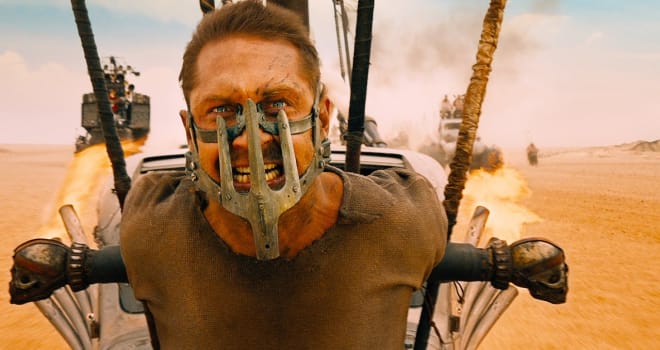 The suspense of this early, chaotic phase of the race is about to end. On Sunday, the Golden Globes will be handed out, but they won't matter much because voting for Oscar nominations ends two days earlier, on January 8. We also haven't heard yet from the Directors Guild of America; their nominations come out Tuesday, January 12, and will offer a strong indication of Oscar voters' picks for Best Director and Best Picture nominations.
The suspense of this early, chaotic phase of the race is about to end. On Sunday, the Golden Globes will be handed out, but they won't matter much because voting for Oscar nominations ends two days earlier, on January 8. We also haven't heard yet from the Directors Guild of America; their nominations come out Tuesday, January 12, and will offer a strong indication of Oscar voters' picks for Best Director and Best Picture nominations.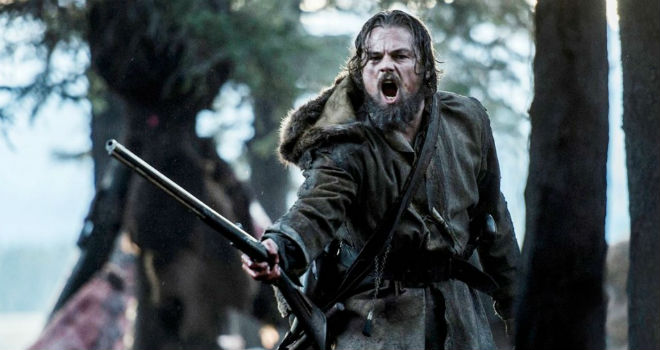
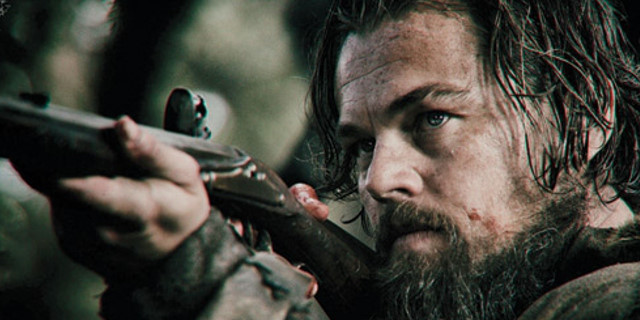 1. Leonardo DiCaprio
1. Leonardo DiCaprio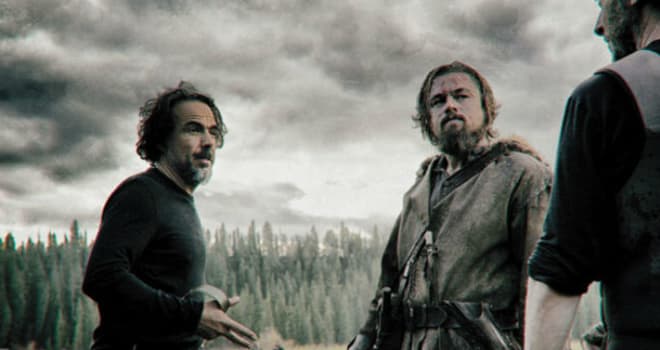 3. The Follow-up to "
3. The Follow-up to "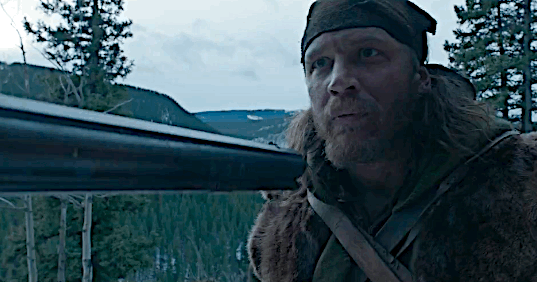 5.
5. 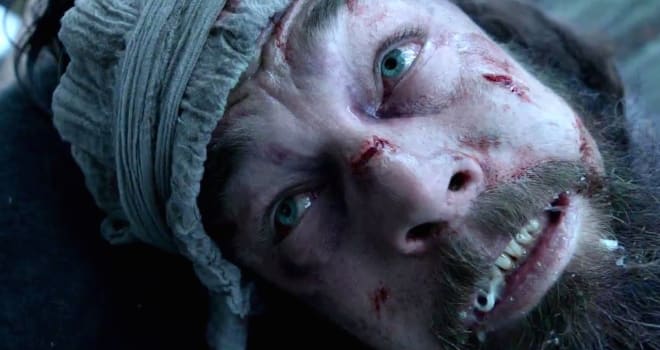 7. The January Doldrums
7. The January Doldrums
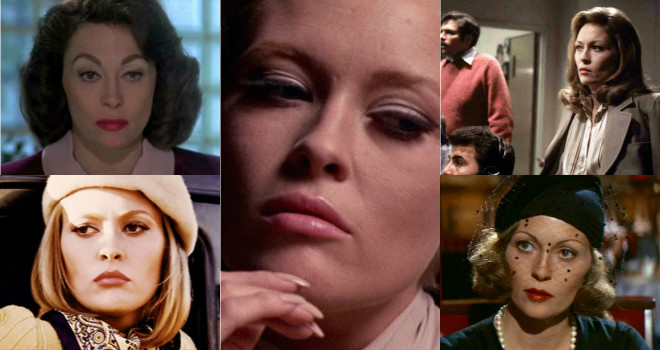 Happy birthday to
Happy birthday to 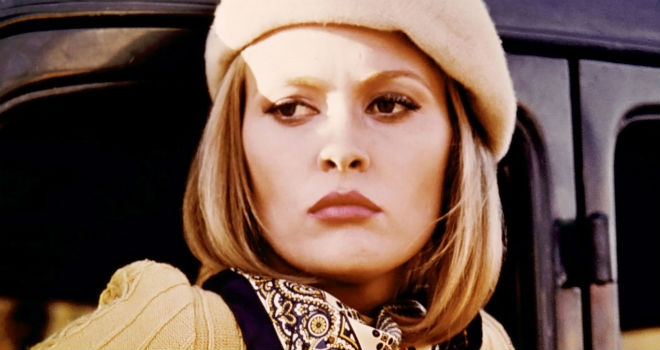 Dunaway became a star and a fashion icon as beret-wearing bank robber Bonnie Parker.
Dunaway became a star and a fashion icon as beret-wearing bank robber Bonnie Parker. 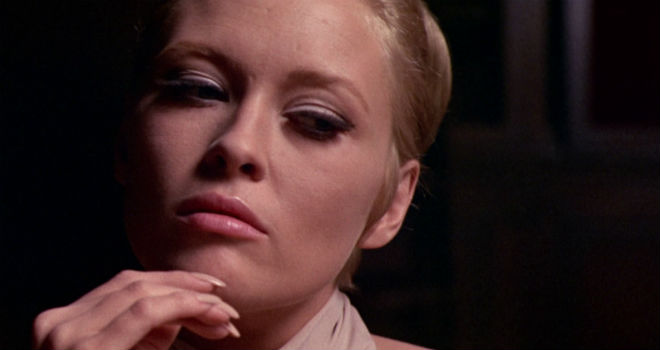 Dunaway played
Dunaway played 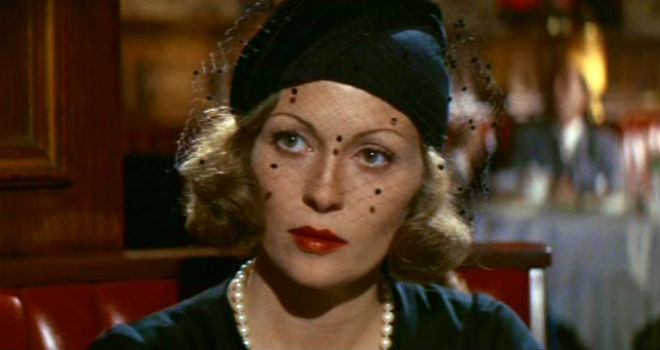 Dunaway gives her most romantic and tragic performance as the femme fatale who pulls private eye
Dunaway gives her most romantic and tragic performance as the femme fatale who pulls private eye 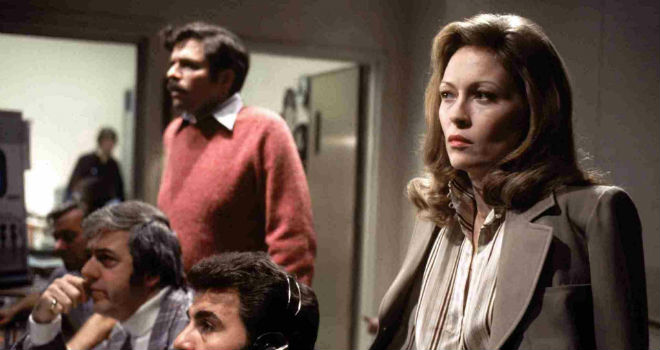 Dunaway won a Best Actress Oscar as the soulless TV executive who'll stop at nothing to drive up ratings. She could have been a cardboard villain, but she's wilier than that. Like other Dunaway characters, her Diana knows how others perceive her and smartly plays to their preconceptions. Besides, in this bleak, prescient satire of TV sensationalism and corporate shamelessness, she's just one villain among many, a symptom of a corrupt system for which there's plenty of blame to go around.
Dunaway won a Best Actress Oscar as the soulless TV executive who'll stop at nothing to drive up ratings. She could have been a cardboard villain, but she's wilier than that. Like other Dunaway characters, her Diana knows how others perceive her and smartly plays to their preconceptions. Besides, in this bleak, prescient satire of TV sensationalism and corporate shamelessness, she's just one villain among many, a symptom of a corrupt system for which there's plenty of blame to go around.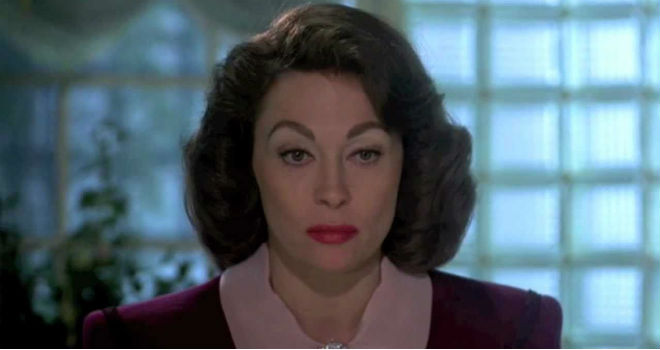 Dunaway went full diva in this
Dunaway went full diva in this 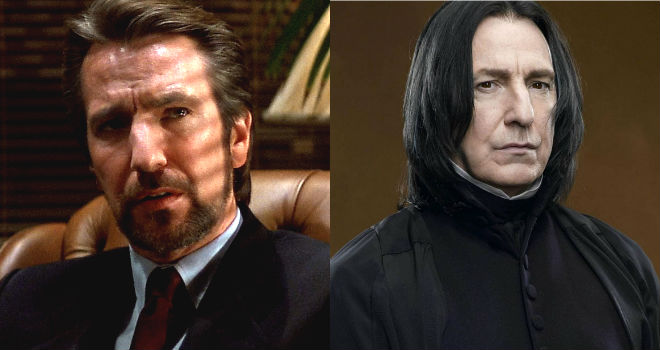
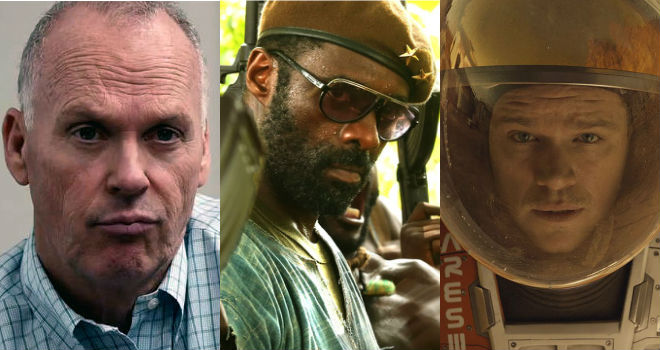 With such a wide-open race this year, it was hard to predict which movies would be the leading candidates to grab an armload of Oscar nominations -- or even how many Best Picture nominees there were likely to be.
With such a wide-open race this year, it was hard to predict which movies would be the leading candidates to grab an armload of Oscar nominations -- or even how many Best Picture nominees there were likely to be.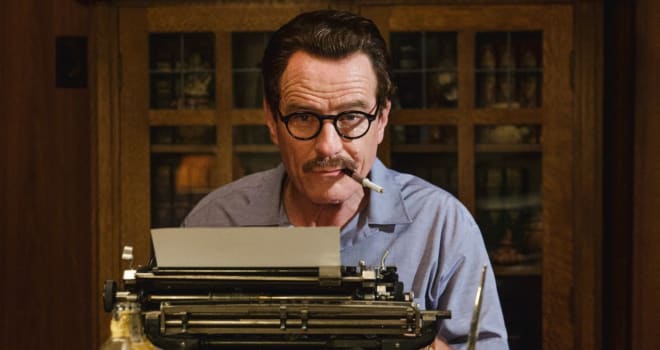 Best Actor
Best Actor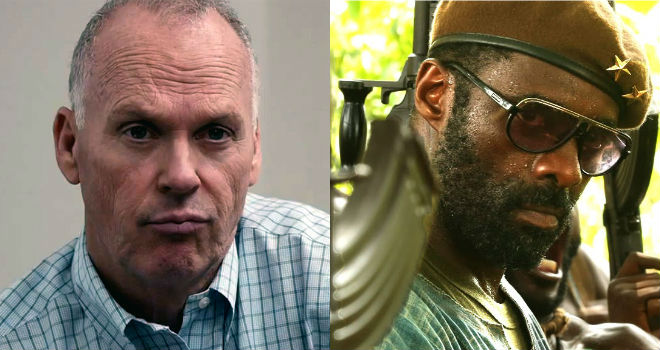 Best Supporting Actor
Best Supporting Actor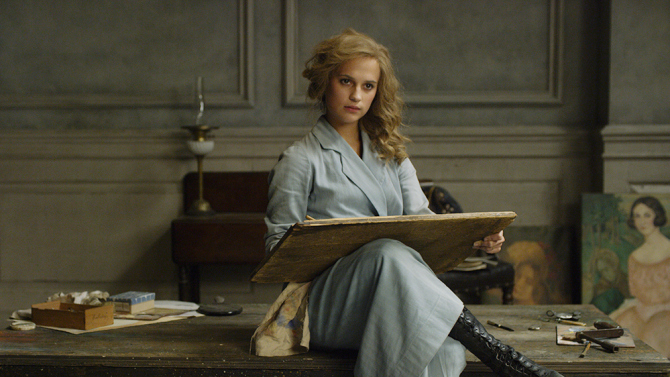 Best Supporting Actress
Best Supporting Actress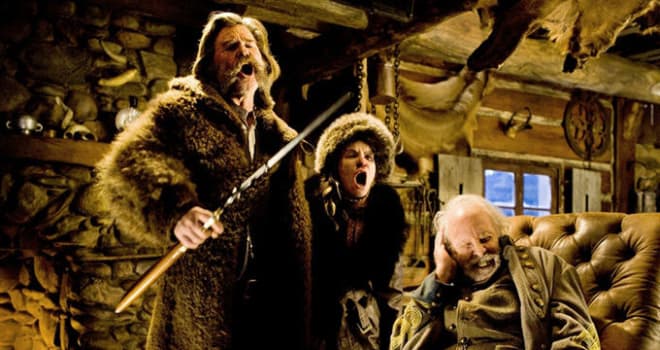 Best Original Screenplay
Best Original Screenplay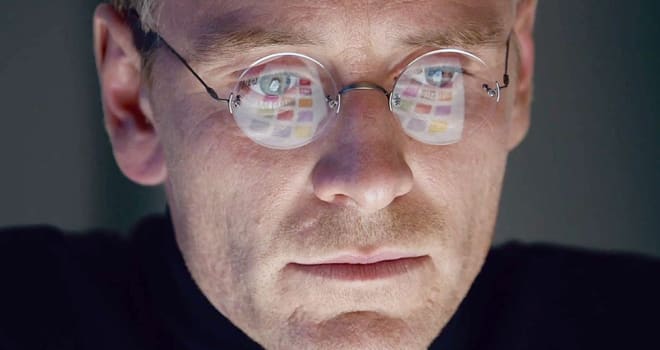 Best Adapted Screenplay
Best Adapted Screenplay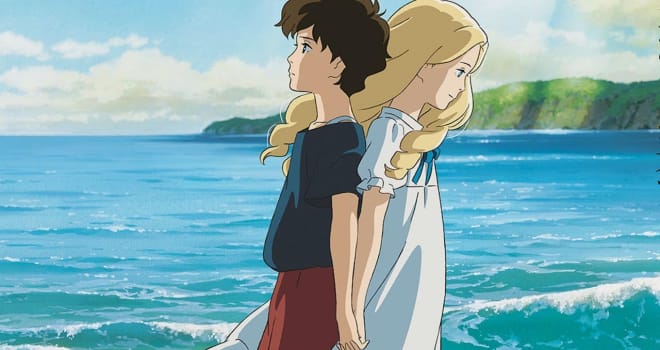 Best Animated Feature
Best Animated Feature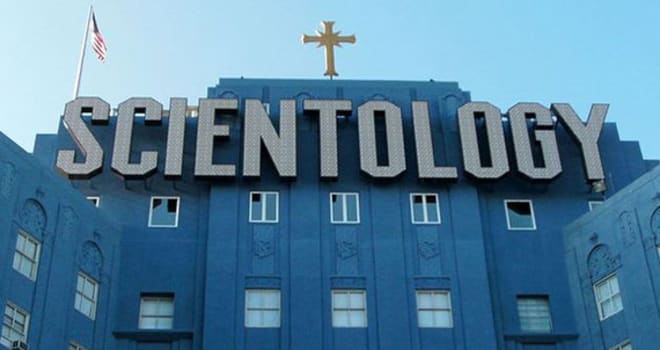 Best Documentary
Best Documentary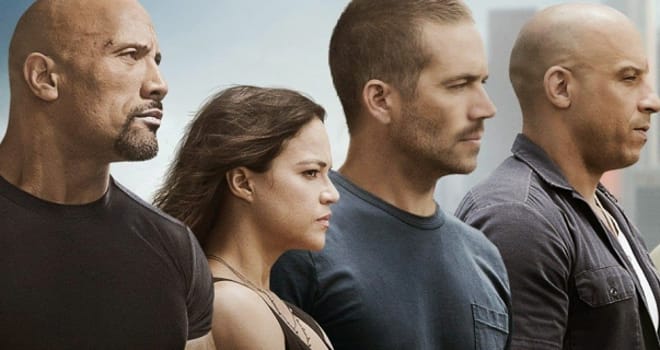 Best Original Song
Best Original Song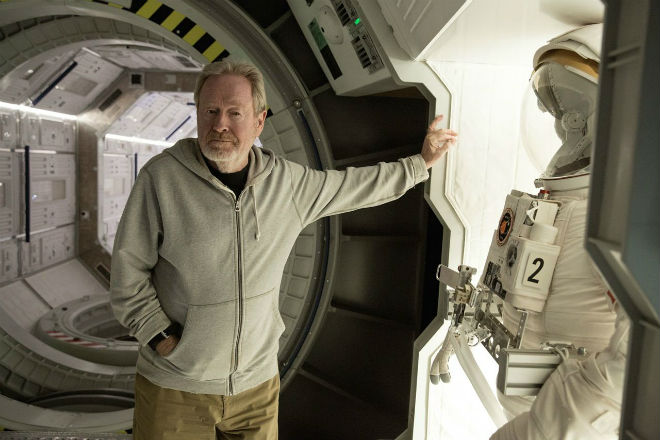 Best Director
Best Director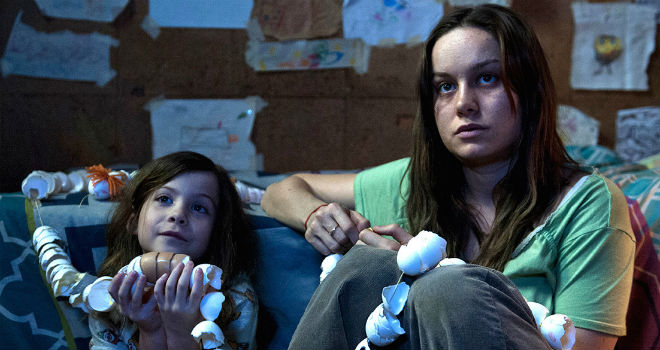 Best Picture
Best Picture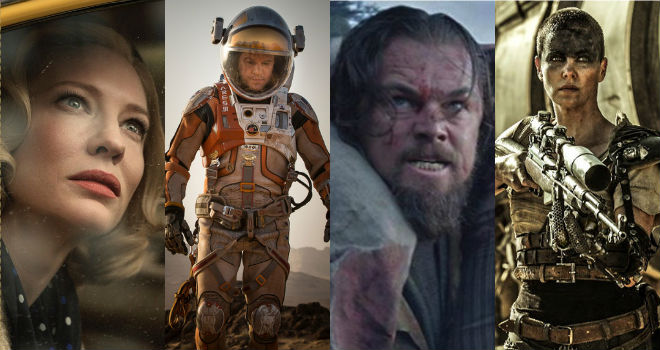 This year's Oscar race was the most wide-open and unpredictable in years -- until T
This year's Oscar race was the most wide-open and unpredictable in years -- until T Remember when "
Remember when " A few years ago, the Academy expanded the Best Picture category beyond five nominees in order to make room for critically-acclaimed blockbusters (read: movies like
A few years ago, the Academy expanded the Best Picture category beyond five nominees in order to make room for critically-acclaimed blockbusters (read: movies like 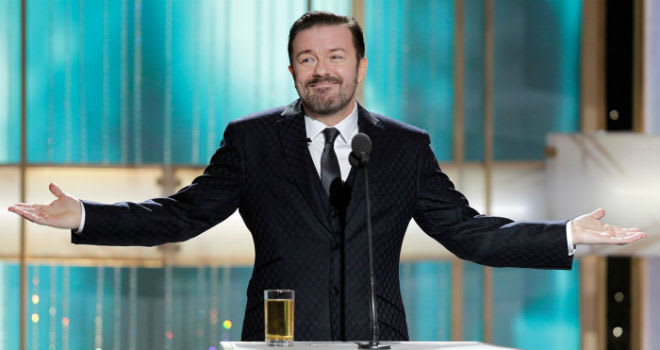 Few experts take the Hollywood Foreign Press Association's annual champagne-fueled bash seriously as an Oscar predictor. After all, they're just 90 journalists from around the world, not the 6,200 Hollywood insiders who make up the Academy. Most of Sunday night's Globe winners and nominees heard their names read again on Thursday morning. They did fail to predict two of
Few experts take the Hollywood Foreign Press Association's annual champagne-fueled bash seriously as an Oscar predictor. After all, they're just 90 journalists from around the world, not the 6,200 Hollywood insiders who make up the Academy. Most of Sunday night's Globe winners and nominees heard their names read again on Thursday morning. They did fail to predict two of  It was pretty funny on Sunday night when Globes host Ricky Gervais joked about awards being bought and paid for, and then the camera cut to Harvey Weinstein, the indie mogul and awards-campaigning master who's managed to earn surprising nominations and wins for his films for a quarter-century. Even Weinstein laughed.
It was pretty funny on Sunday night when Globes host Ricky Gervais joked about awards being bought and paid for, and then the camera cut to Harvey Weinstein, the indie mogul and awards-campaigning master who's managed to earn surprising nominations and wins for his films for a quarter-century. Even Weinstein laughed.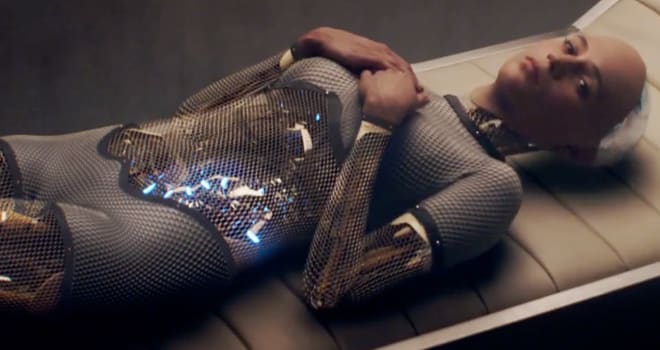
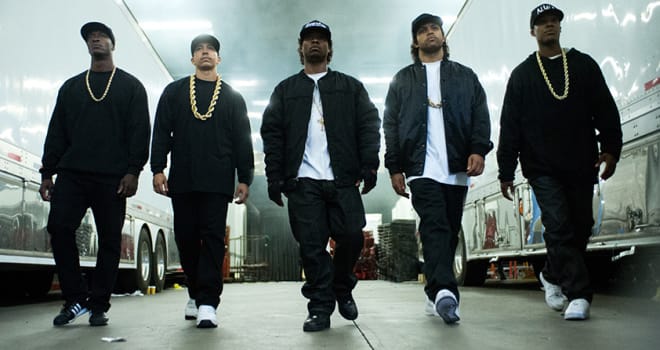 The 2014 slate, which saw multiple victories and nominations for "12 Years a Slave" and its cast, is looking more and more like a fluke. Last year's list, despite the presence of "Selma," saw no performers of color nominated. Despite the outcry that caused,
The 2014 slate, which saw multiple victories and nominations for "12 Years a Slave" and its cast, is looking more and more like a fluke. Last year's list, despite the presence of "Selma," saw no performers of color nominated. Despite the outcry that caused, 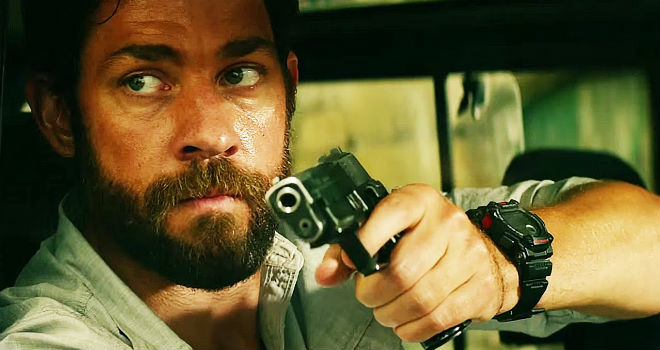
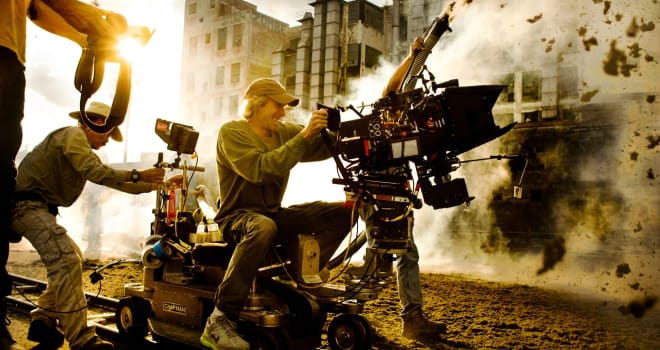 2. Michael Bay
2. Michael Bay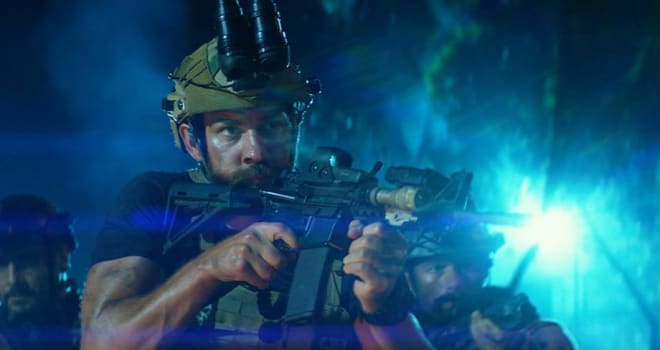 4. Lack of Star Power
4. Lack of Star Power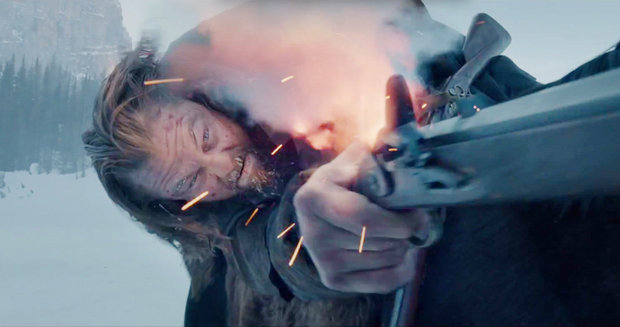 6. Tough Competition
6. Tough Competition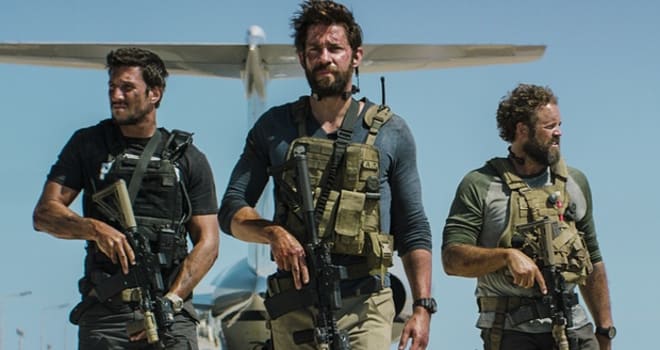 8. Benghazi Fatigue
8. Benghazi Fatigue